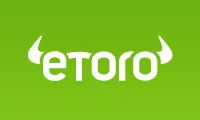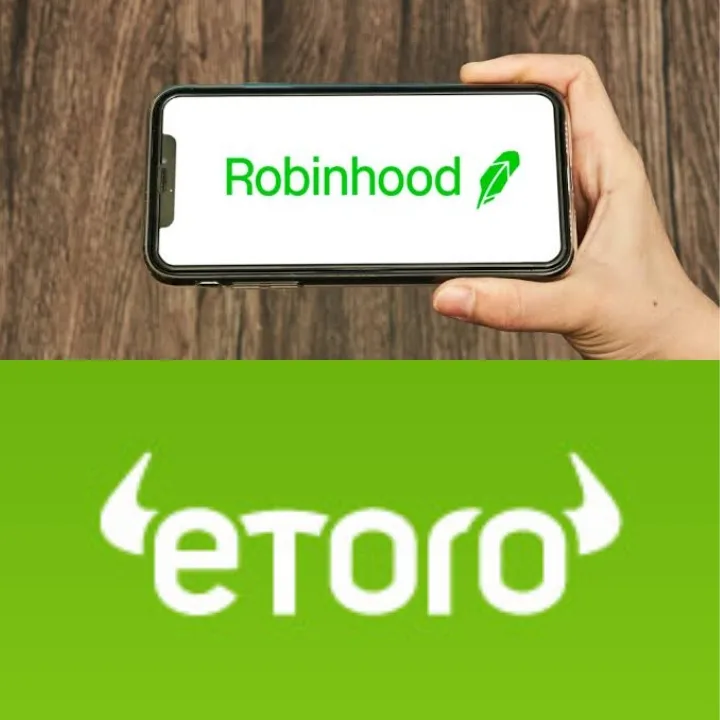The world of online investing has become increasingly accessible, with platforms like eToro and Robinhood attracting millions of users, particularly new investors.
eToro was founded in January 2007 by Yoni Assia, Ronen Assia and David Ring, the platform boasts of about 35 million users. Robinhood on the other hand was founded in April 2013 by Vladimir Tenev and Baiju Bhatt , the platform boasts of about 23.6 users.
Both platforms offer commission-free stock and ETF trading, user-friendly interfaces, and mobile apps, making them attractive choices for beginners. However, choosing the right platform depends on your specific needs and investment goals. This guide dives deep into eToro vs Robinhood, comparing their features, fees, investment options, and overall user experience to help you decide which platform is the better fit for you.

eToro vs Robinhood; Investment Products Offered
eToro investment products
- Stocks: Access to thousands of stocks from various global markets.
- ETFs: Invest in a diverse range of Exchange-Traded Funds.
- Cryptocurrencies: Buy and sell a wide variety of cryptocurrencies (CFD contracts, not actual ownership).
- CFDs (Contracts for Difference): Trade on price movements of various assets like commodities, currencies, and indices without directly owning them.
Robinhood Investment products
- Stocks: Trade US-listed stocks and some ADRs (American Depositary Receipts) representing international companies.
- ETFs: Invest in a broad selection of ETFs.
- Options: Trade stock options for more advanced investors (not recommended for beginners).

eToro vs Robinhood: Fees and Commissions
eToro fees and commissions:
- Commission-free trading: No commission fees for buying and selling stocks and ETFs.
- Spreads: Makes money through the difference between the buy and sell price of an asset (spreads can vary).
- Inactivity fee: A $10 monthly fee applies to accounts inactive for one year or more.
- Withdrawal fees: A $5 fee applies for withdrawals below $50.
Robinhood fees and commissions:
- Commission-free trading: No commission fees for stock and ETF trades.
- Margin interest: Charged for borrowing money to invest on margin (risky and not beginner-friendly).
- Foreign exchange fees: A 1% fee applies to currency conversion for ADRs. No account inactivity fees.
Overall: Both platforms offer commission-free stock and ETF trading. However, eToro charges spreads, while Robinhood may have hidden costs through foreign exchange fees for ADRs.
eToro vs Robinhood: Account Minimum Deposit
eToro minimum deposit:
The minimum deposit amount can vary depending on your location and payment method (typically $50-$100).
Robinhood minimum deposit:
No minimum deposit amount required.
eToro vs Robinhood: Platform Features
eToro features:
- Copy Trading: Allows you to automatically copy the trades of experienced investors on the platform.
- Smart Portfolios: Pre-built thematic investment portfolios managed by eToro.
- Fractional Shares: Invest in fractions of shares, allowing you to participate in expensive stocks with a smaller investment.
Robinhood features:
- Stock Lending: Earn interest by lending out your shares.
- Fractional Shares: Similar to eToro, allows investment in fractions of shares.
- Options Trading: Offers options trading for experienced investors.
- Margin Trading: Robinhood offers margin trading, which can be risky for beginners due to the potential for magnified losses.
Overall: eToro offers unique features like copy trading and Smart Portfolios, while Robinhood allows you to earn interest through stock lending (risky for beginners). Both platforms offer fractional shares investment.
eToro vs Robinhood: Trading Experience
eToro:
- User-friendly interface: Easy to navigate for new investors.
- Etoro offers 2 order types: Market orders and Limit orders.
- Focus on social trading: Platform emphasises social interaction and following other investors.
Robinhood:
- Simple and intuitive interface: designed for quick and easy trades.
- Robinhood offers 3 order types; Market orders, Limit orders and Stop orders.
Overall: Both platforms have user-friendly interfaces and very few order types.
Regulation and Security
eToro:
- Regulated by various financial authorities globally, including the FCA (UK), CySEC (Cyprus), ASIC (Australia), and FinCEN (US). Uses industry-standard security measures to protect user funds.
- CFDs: It’s important to understand that when you invest in stocks or ETFs on eToro, you’re not buying the underlying asset itself (CFD contracts).
Robinhood:
- Regulated by FINRA (Financial Industry Regulatory Authority) and the SEC (Securities and Exchange Commission) in the US.
- Users’ funds and security are protected by SIPC.
Overall: Both platforms are regulated by reputable financial authorities and employ security measures to safeguard user funds. However, eToro utilizes CFDs, and Robinhood offers margin trading, both of which carry additional risks compared to traditional stock ownership.
Who Should Choose eToro?
You might prefer eToro if:
- You’re interested in a wider variety of assets, including cryptocurrencies and commodities (through CFDs).
- You’d like to try copy trading and leverage the social aspects of the platform.
- You’re comfortable with a spread-based fee structure.
- You plan to invest in expensive stocks and want the flexibility of fractional shares.
Who Should Choose Robinhood?
Robinhood might be a better fit if:
- Your focus is solely on US-listed stocks and ETFs.
- You prioritize a straightforward and mobile-centric trading experience.
- You’re interested in earning extra income through stock lending.
- You plan to invest in small portions of expensive stocks using fractional shares.
Summary
| Feature | eToro | Robinhood |
| Investment Products | Stocks, ETFs, Crypto (CFDs), Commodities (CFDs) | US Stocks, ETFs, some ADRs, Options |
| Fees | Spreads, Inactivity fee, Withdrawal fees | Margin Interest, Foreign exchange fees (ADRs) |
| Account Minimum | Varies by location/payment method (typically $50-$100) | No minimum deposit required |
| Account Features | Copy Trading, Smart Portfolios, Fractional Shares | Stock Lending, Fractional Shares, Options Trading |
| Trading Experience | User-friendly, social focus | Simple, mobile-centric |
| Regulation | FCA, CySEC, ASIC, FinCEN (global) | FINRA, SEC (US) |
Beginner’s Tip
- Investment goals: Clearly define your investment goals – short-term gains, long-term wealth building, or a combination? Choose a platform that aligns with your goals.
- Risk tolerance: How comfortable are you with risk? eToro’s CFDs and Robinhood’s margin trading can magnify potential losses. Start cautiously and prioritize understanding risk management strategies.
- Research and education: Regardless of the platform you choose, invest time in researching potential investments and educating yourself about the financial markets.
Beyond eToro and Robinhood: Exploring Other Options
While eToro and Robinhood are popular choices for beginners, they aren’t the only options available. Here’s a brief look at some alternative platforms you might consider:
1. Charles Schwab
Trading Features:
You can trade a wide range of investments including US stocks, Exchange-Traded Funds (ETFs), and options contracts.
Order Types:
Place a variety of orders including market, limit, and stop orders to suit your trading strategies.
Fractional Shares:
Invest in fractional shares of US stocks and ETFs, allowing you to purchase a portion of a share with any amount of money.
Minimum Deposit:
no minimum deposit.
Security:
- Encryption: Industry-standard encryption protects your data during transfers.
- Schwab Security Guarantee: They offer a 100% guarantee to cover losses in your Schwab accounts due to unauthorized activity.
Regulations
- Charles Schwab is a FINRA member, meaning they are subject to regulations that help protect investors.
- They are also SIPC insured.
2. Fidelity Investments
Trading Features:
- Wide Investment Selection: Trade US stocks, ETFs, options contracts, and even fractional shares
- Advanced Order Types: Utilize various order types like market, limit, stop, and trailing stops.
- Fidelity Spire: This loyalty program rewards frequent traders with benefits like commission discounts and expense ratio waivers on certain ETFs.
Minimum Deposit:
- There is no minimum deposit required.
Security:
- Two-Factor Authentication: Enhance login security with an extra layer of verification beyond your password.
- Encryption: Industry-standard encryption safeguards your data during transfers.
- Account Protection: Fidelity offers a similar guarantee to Charles Schwab, covering losses due to unauthorized activity in your accounts.
Regulations:
- Fidelity Investments is also an FINRA member.
- They are also SIPC insured.
3. Webull
Webull has gained popularity for its user-friendly interface and commission-free stock and ETF trading.
Trading Features:
- Commission-Free Trading: Trade US stocks and ETFs without paying commissions. This can be a significant advantage for frequent traders.
- Fractional Shares: similar to the previous platforms, webull also allows users to purchase a fraction of US stocks and ETFs with any amount of money.
- Margin Trading: Access margin for qualified accounts to amplify potential returns.
- Advanced Order Types: various order types such as market, limit, stop, and trailing stops.
Minimum Deposit:
- Webull has no minimum deposit requirement .
Security:
- Encryption: Webull uses encryption to protect your data during transfers.
- Two-Factor Authentication: Enhance login security with an extra layer of verification beyond your password.
- Account Protection: While details aren’t as widely available as with some competitors, Webull offers account protection similar to other brokers, likely covering losses due to unauthorized activity.
Regulations:
- Webull is regulated by the Securities and Exchange Commission (SEC) and is a member of FINRA.
- They are also SIPC insured.
Important Considerations Before Choosing Any Platform:
Fees: Look beyond just commission-free trades. Consider spreads (eToro), inactivity fees, withdrawal fees, and margin interest charges (Robinhood).
Account minimums: Some platforms have minimum deposit requirements that may not suit your initial investment amount.
Regulation: Ensure the platform is regulated by reputable financial authorities.
Investment products: Choose a platform that offers the investment products you’re interested in (stocks, ETFs, options, crypto, etc.).
Educational resources: Does the platform offer educational resources to help you learn about investing?
Customer service: It is also important to consider the platform’s customer service options in case you encounter any issues.
Conclusion
Etoro vs Robinhood, choosing between them depends on your investment goals, risk tolerance, and desired features. Carefully consider the factors discussed in this guide and don’t hesitate to explore both platforms’ demo accounts before committing real money. Remember, responsible investing involves research, risk management, and a long-term perspective. By understanding the strengths and weaknesses of both eToro and Robinhood, you’ll be better equipped to make an informed decision and embark on your investment journey.
FAQs
Between eToro and Robinhood which platform is safer?
Both eToro and Robinhood are regulated by reputable financial authorities and employ security measures to protect user funds. However, the specific investment products offered by each platform introduce different risk profiles. For beginners, understanding CFDs (eToro) and margin trading (Robinhood) is crucial before investing.
Can I make more money on eToro or Robinhood?
Your potential returns depend on your investment choices and market performance, not the platform itself. Both platforms offer commission-free stock and ETF trades. However, eToro’s spreads and Robinhood’s potential margin interest charges can affect your overall returns.
Is copy trading on eToro a good idea?
Copy trading can be a good option for beginners, but past performance doesn’t guarantee future results. Carefully research the investors you want to copy, understand their risk tolerance and strategies, and don’t blindly follow anyone.
Between eToro and Robinhood which platform has a better mobile app?
Both platforms boast user-friendly mobile apps. Robinhood’s app is known for its streamlined design, while eToro’s app emphasizes social features. Ultimately, the “better” app depends on your individual preferences.






